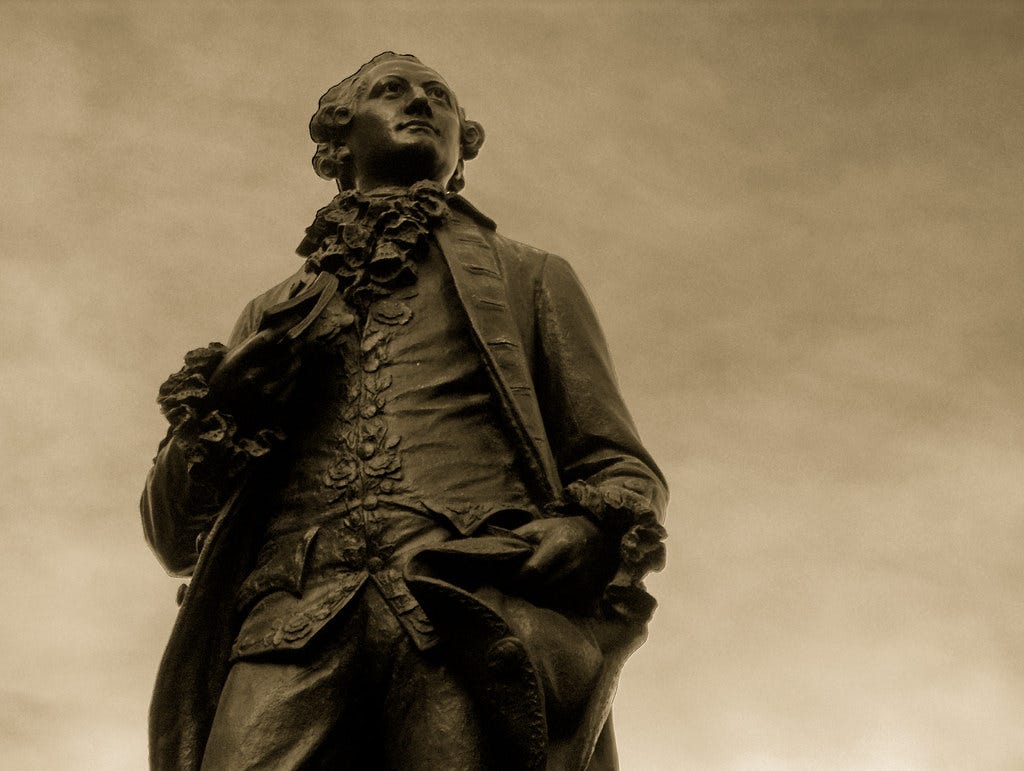Becoming artists of ourselves: Goethe finds redemption through human limitation
Goethe shows us how death and anxiety connect us to the power of nature

In a short poem called Limits of Human Nature, Johann Wolfgang von Goethe manages to affirm what makes human beings unique while meditating on our inescapable finitude. At first glance, the poem seems to be simply reminding us to avoid hubris and maintain awe at the vastness of nature. However, in short, punchy lines and through the use of precise and resonant images, Goethe is also showing us how our very limitations are what connect us to the oneness of existence.
The first stanza opens the poem with a series of paradoxical images that blend Christian undertones with a pagan reverence for the natural world. The ‘primeval Holy Father’ holds a ‘temperate hand’ over the world and scatters ‘lightenings of blessings’ over creation. The fusion of biblical and folkloric rhetoric make for an ambiguity that helps to convey the slightly unsettling ‘sublime’ that Goethe wants to convey. And this effect is compounded by the fact that there is also a tone of celebration amid the dread. Because of all this Goethe says:
‘I kiss the lowest
Hem of his garment,
Childlike awe throbbing
True in my breast.’
The evocation of childish innocence and the emphasis on the awe pulsing ‘true’ in his chest, leaves us with a positive atmosphere, an airiness and exaltation even in the act of kneeling to worship. In the face of the sublime, the poet bows in humility but it is not self-abnegation— rather something which steadies him.
In the next verse Goethe makes his point explicit: don’t try to be a god, because in doing so you lose your very humanity, and in effect, you make yourself powerless. By overshooting his own limits, a man makes himself something less than a man. Goethe writes:
‘If he uplifts himself
And bestirs
The stars with his cranium,
Nowhere then cleave
His uncertain footsoles,
And with him
Play the clouds and the winds.’
A proper reverence can only happen when we are rooted in our humanity. The desire to escape that reality, free of the body and the earth, is not just arrogance but self-annihilation. And a self that annihilates itself cannot be capable of awe and wonder. It is curious here that Goethe makes his point with a mix of scientific and prosaic language and nature-mysticism. Words like ‘cranium’ and ‘footsoles’ rub up against phrases like ‘bestirs the stars’ or ‘with him/Play the clouds and the winds.’ In the short, punchy two-beat lines this makes for a dart-like quality to the poem, the sense of no fat being left on the bone of the poet’s insight.
To ‘stand firm’ with our ‘marrowy bones’ on the ‘enduring earth’ is Goethe’s ideal. To accept our finitude is not to embrace our limits in a puritan sense, to define ourselves as depraved and broken. Rather, it is to see the sublime precisely in our earthliness, because it is our very limits and finitude that connect us to earth. A man who is humble actually empowers himself.
‘Then he aspires not,
Save to the oak tree
Or to the vine
Himself to liken.’
These brief and concise images are dense with resonance. To aspire not to domination of nature and death, but to live with the steady grace of an oak tree, is to embrace a quiet beauty and fortitude. The oak has a kingly quality, a sturdiness. And the vine of course has Dionysian connotations. To aspire to this plant is to see resurrection even in our own death, to find creative renewal in our vulnerability. The combination of these mythic and charged images with the brief, unheroic lines, mirrors the ‘triumph in humility’ that Goethe is trying to convey, and give the poem’s structure its meaningful power.
Goethe then goes on to make it plain that what makes humanity unique is our irrefutable subjugation to nature’s power. The gods command the seas and winds, but we are ‘gathered’ and ‘swallowed’ by them. However, this is not a cause for despair because to be subjects of nature in this way makes us part of the ‘eternal stream’ of life.
And this leads us to Goethe’s final, aphoristic ending
‘A little ring
Confines our life,
And many generations
Link up, enduring
On their existence’s
Endless chain.’
To seek to conquer death and deny our limitations is paradoxically to deny what is ‘enduring’ in life’s ‘endless chain.’ We are links in a chain, and we cannot know our connectedness to the vastness of being, unless we embrace the truth that we are just a tiny part of it. To seek to identify with the gods, would be to annihilate the very lasting quality of life.
There are many of the preoccupations of Romanticism here. Our relationship with nature, a sense of awe and the dread sublime. The need to reconcile ourselves with our finitude. In the age of Sensibility, and in Romanticism, the solace of eternal life in the Christian, theological sense, was no longer a given. The world was not guided by a cosmic purpose, but governed by laws. Reason—our ability to understand and harness these laws—was not enough to replace this loss of immortality. Reason can always be turned on itself, as empiricists like David Hume demonstrated. Everything can be doubted, everything is uncertain. So here we see Goethe turning to nature and the mystery of life’s unity, but he is doing so without the shrill gesticulations of many his contemporaries. Death for Goethe is a window into wholeness, not an end to it. In this poem he exerts a tight control on his lines and his metaphors, which make this meditation on human limits inspiring and promising, rather than fatalistic.
This study of Goethe’s poem is done only using Vernon Watkins’s translation.



